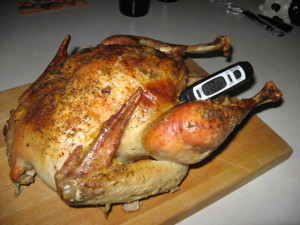The UK Food Standards Agency has issued a call for people to stop washing raw chicken to reduce the risk of contracting Campylobacter, a potentially dangerous form of food poisoning.
 The call comes as new figures show that 44% of people always wash chicken before cooking it – a practice that can spread Campylobacter bacteria onto hands, work surfaces, clothing and cooking equipment through the splashing of water droplets.
The call comes as new figures show that 44% of people always wash chicken before cooking it – a practice that can spread Campylobacter bacteria onto hands, work surfaces, clothing and cooking equipment through the splashing of water droplets.
Campylobacter is the most common form of food poisoning in the UK, affecting an estimated 280,000 people a year. Around four in five of these cases come from contaminated poultry.
As part of the call – which comes at the start of this year’s Food Safety Week – the FSA has written to production companies that make food programmes, asking them to ensure that people aren’t shown washing raw chicken on TV. The letter, which can be found via the link towards the bottom of this page, has been co-signed by all of the major food retailers.
FSA Chief Executive, Catherine Brown, said: ‘Although people tend to follow recommended practice when handling poultry, such as washing hands after touching raw chicken and making sure it is thoroughly cooked, our research has found that washing raw chicken is also common practice. That’s why we’re calling on people to stop washing raw chicken and also raising awareness of the risks of contracting campylobacter as a result of cross-contamination.
The most cited reasons people gave for washing chicken were the removal of dirt (36%), getting rid of germs (36%) and that that they had always done it (33%).
Ann Edwards, 67, from Hertfordshire contracted campylobacter in 1997 and is still living with the consequences today. She said: ‘After contracting campylobacter poisoning, I was ill for a week before being admitted to hospital with bladder failure. I couldn’t eat and was so de-hydrated that I lost almost two stones in weight. Shortly after, I developed Guillain-Barré syndrome which left me paralysed from the chest down. I was in hospital for seven weeks and even now – 17 years later – I have no movement in my toes and rely on a walking stick. Physically, it has been the worst thing that has ever happened to me. I urge anyone who is handling chicken to take care and follow the advice given by the Food Standards Agency.’
For more information on the FSA’s campylobacter campaign, and for guidance on the safest way to handle chicken, visit food.gov.uk/chicken
For more information on the FSA’s strategy to tackle campylobacter, visitfood.gov.uk/actnow.
